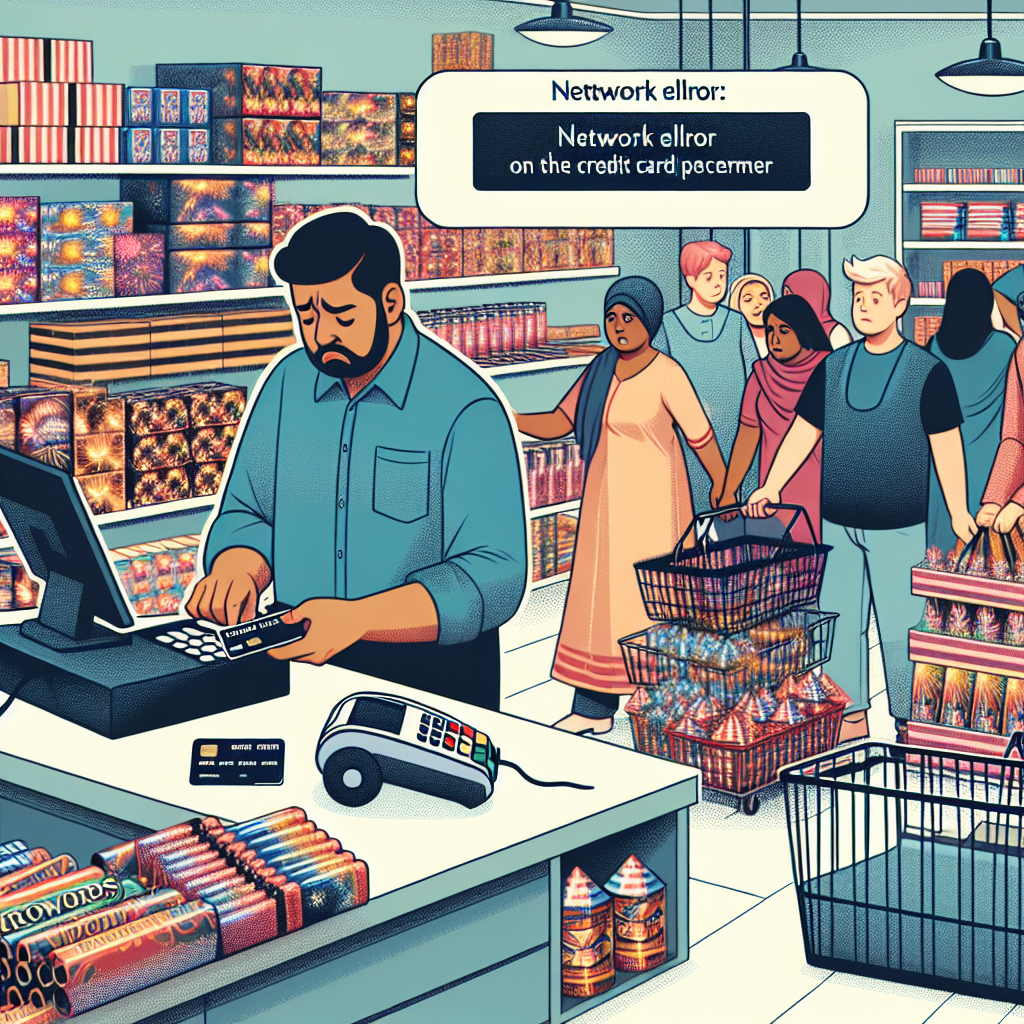
By Shelly Graves April 10, 2024
The Impact of Seasonality on Payment Processing for Fireworks Retailers
Fireworks retailers face a unique set of challenges when it comes to payment processing. Unlike other retail businesses, fireworks retailers experience a high level of seasonality in their sales. This means that their sales and revenue are heavily dependent on certain times of the year, such as holidays and special events. As a result, payment processing for fireworks retailers can be a complex and daunting task.
One of the main challenges that fireworks retailers face is the fluctuation in sales volume. During peak seasons, such as the Fourth of July and New Year’s Eve, fireworks retailers experience a surge in sales. This can lead to a sudden increase in the number of transactions that need to be processed, which can put a strain on their payment processing systems. On the other hand, during off-peak seasons, sales can be significantly lower, resulting in a decrease in revenue. This can make it difficult for retailers to cover their operational costs, including payment processing fees.
Another challenge for fireworks retailers is the high-risk nature of their business. Fireworks are considered hazardous materials and are subject to strict regulations and safety standards. This makes it challenging for retailers to find payment processors who are willing to work with them. Many payment processors consider fireworks retailers to be high-risk merchants and may charge higher fees or even refuse to provide services altogether. This can be a major obstacle for retailers, as they may struggle to find a reliable and affordable payment processing solution.
The seasonality of the fireworks industry also poses a challenge for retailers when it comes to managing cash flow. During peak seasons, retailers may experience a sudden influx of cash, which can be difficult to manage and track. On the other hand, during off-peak seasons, retailers may struggle to generate enough revenue to cover their expenses. This can lead to cash flow issues and make it challenging for retailers to plan and budget for their payment processing needs.
In addition to these challenges, fireworks retailers also have to deal with the issue of chargebacks. Chargebacks occur when a customer disputes a transaction and requests a refund from their bank or credit card company. This can happen for various reasons, such as a customer being dissatisfied with the product or not recognizing the charge on their statement. For fireworks retailers, chargebacks can be particularly problematic as they often involve large sums of money. This can have a significant impact on their cash flow and profitability, especially during peak seasons when the volume of transactions is high.
To overcome these challenges, fireworks retailers need to have a solid payment processing strategy in place. This includes finding a payment processor who understands the unique needs of their business and is willing to work with them. It is essential for retailers to do their research and compare different payment processing options to find the best fit for their business.
Retailers should also invest in payment processing systems that can handle high transaction volumes and have robust security measures in place to protect against fraud and chargebacks. It is crucial for retailers to have a clear understanding of their cash flow and budget for payment processing fees accordingly. This can help them avoid cash flow issues and ensure that they can cover their expenses during both peak and off-peak seasons.
In conclusion, the seasonality of the fireworks industry presents several challenges for retailers when it comes to payment processing. From managing fluctuating sales volumes to dealing with high-risk merchant status and chargebacks, retailers must navigate through these obstacles to ensure the smooth operation of their business. By understanding these challenges and implementing a solid payment processing strategy, fireworks retailers can overcome these hurdles and thrive in their industry.
Navigating Compliance and Regulations in Fireworks Payment Processing
Fireworks retailers face a unique set of challenges when it comes to payment processing. As the demand for fireworks increases during holidays and celebrations, retailers must be prepared to handle a high volume of transactions. However, navigating compliance and regulations in fireworks payment processing can be a daunting task.
One of the biggest challenges for fireworks retailers is complying with state and federal regulations. Fireworks are highly regulated due to their potential for danger and misuse. Each state has its own set of laws and regulations regarding the sale and use of fireworks, making it difficult for retailers to keep up with the constantly changing landscape.
In addition to state regulations, fireworks retailers must also comply with federal laws such as the Consumer Product Safety Commission (CPSC) regulations. These regulations require retailers to obtain a license to sell fireworks and adhere to strict safety standards. Failure to comply with these regulations can result in hefty fines and even the revocation of a retailer’s license.
Another challenge for fireworks retailers is finding a payment processor that is willing to work with them. Many traditional payment processors are hesitant to work with fireworks retailers due to the high-risk nature of the industry. This can make it difficult for retailers to find a reliable and affordable payment processing solution.
Even when a retailer does find a payment processor, they may face higher fees and stricter requirements. This is because fireworks retailers are considered high-risk merchants, which means they are more likely to experience chargebacks and fraud. As a result, payment processors may require retailers to have a reserve account or pay higher processing fees to mitigate the risk.
Furthermore, fireworks retailers must also navigate the challenges of online payment processing. With the rise of e-commerce, many retailers have turned to online sales to reach a wider customer base. However, online payment processing for fireworks can be even more complex due to the increased risk of fraud and chargebacks.
To mitigate these risks, retailers may need to implement additional security measures such as 3D Secure or address verification systems. These measures can add an extra layer of protection but can also be costly and time-consuming to implement.
In addition to compliance and payment processing challenges, fireworks retailers must also be aware of the potential for fraudulent transactions. Fireworks are a popular item for scammers to target, especially during peak seasons. Retailers must be vigilant in detecting and preventing fraudulent transactions to protect their business and customers.
One way to combat fraud is by implementing a robust fraud detection system. This can include using fraud prevention tools such as address verification, IP geolocation, and device fingerprinting. Retailers should also regularly monitor their transactions for any suspicious activity and have a plan in place to handle chargebacks and disputes.
In conclusion, navigating compliance and regulations in fireworks payment processing can be a complex and challenging task for retailers. From state and federal regulations to finding a payment processor and preventing fraud, retailers must be diligent in their efforts to ensure a smooth and secure payment process. By staying informed and implementing the necessary measures, retailers can overcome these challenges and continue to provide their customers with a safe and enjoyable fireworks experience.
Addressing Fraud and Chargebacks in Fireworks Retail Payment Processing
Fireworks retailers face a unique set of challenges when it comes to payment processing. As the demand for fireworks increases during holidays and special events, retailers must be prepared to handle a high volume of transactions. However, with the rise of online shopping and the prevalence of fraud and chargebacks, payment processing for fireworks retailers has become even more complex.
One of the biggest challenges for fireworks retailers is addressing fraud. With the increase in online sales, fraudsters have found ways to exploit the system and make fraudulent purchases. This is especially true for high-risk industries like fireworks retail. Fraudsters often use stolen credit card information to make purchases, leaving retailers to deal with the consequences.
To combat fraud, fireworks retailers must implement strict security measures. This includes using fraud detection tools and verifying the identity of customers before processing transactions. Additionally, retailers should regularly monitor their transactions for any suspicious activity and have a system in place to flag and investigate potential fraudulent purchases.
Another challenge for fireworks retailers is dealing with chargebacks. Chargebacks occur when a customer disputes a charge on their credit card statement. This can happen for a variety of reasons, such as a customer not recognizing the charge or claiming that the product was not as described. Chargebacks can be costly for retailers, as they not only result in lost revenue but also incur additional fees from the payment processor.
To address chargebacks, retailers must have a clear and transparent refund policy in place. This should be clearly stated on their website and communicated to customers at the time of purchase. Additionally, retailers should keep detailed records of all transactions and have a system in place to track and respond to chargeback requests in a timely manner. By providing evidence of the transaction and the product or service delivered, retailers can increase their chances of successfully disputing chargebacks.
In addition to fraud and chargebacks, fireworks retailers also face challenges with payment processing fees. Due to the high-risk nature of the industry, payment processors often charge higher fees for processing transactions. This can significantly impact the profit margins of retailers, especially during peak seasons when sales are high.
To mitigate the impact of payment processing fees, retailers should shop around for the best rates and negotiate with payment processors. It is also important for retailers to regularly review their payment processing fees and make adjustments as needed. By keeping a close eye on these fees, retailers can ensure that they are not paying more than necessary and can maintain healthy profit margins.
Another way for fireworks retailers to address payment processing challenges is by offering multiple payment options. By providing customers with a variety of payment methods, retailers can cater to different preferences and increase the likelihood of completing a sale. This can also help to reduce the risk of fraud, as different payment methods may have different security measures in place.
In conclusion, payment processing for fireworks retailers is not without its challenges. From fraud and chargebacks to high fees and limited payment options, retailers must be prepared to navigate these obstacles in order to maintain a successful business. By implementing strict security measures, having a clear refund policy, and exploring different payment options, retailers can address these challenges and ensure a smooth payment processing experience for both themselves and their customers.

